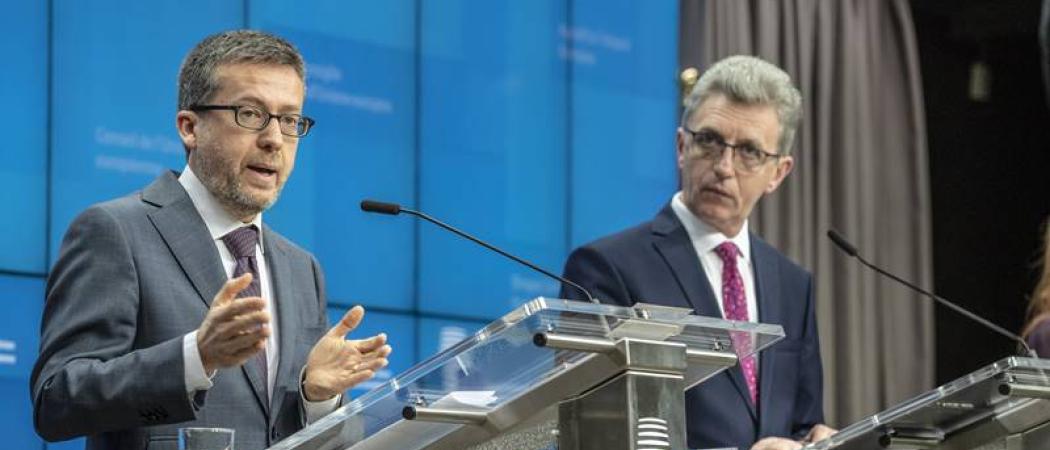At Council meeting, EU member states agree on the programme’s ‘fundamental aspects’, Commissioner says. But they are still debating the details

EU research commissioner Carlos Moedas (left) and Romanian research minister Nicolae Hurduc speaking at a press conference in Brussels. Photo: European Union
European research ministers agreed on the broad themes for a series of research “missions” and partnerships in the forthcoming Horizon Europe programme — but the details of exactly what they will include have yet to be resolved.
European Union ministers met 19 February in one of their regularly scheduled Competitiveness Council sessions to discuss the specifics of Horizon Europe, the EU’s forthcoming €94.1 billion research programme. High on the agenda were what European Commission officials are budgeting as specific goals, or missions, for research grants and public-private partnerships for R&D. The purpose and scope of these missions and partnerships have been under debate for several months.
The idea behind missions is to create projects focused on specific challenges, such as curing cancer and addressing climate change. EU Research Commissioner Carlos Moedas said in a press conference after the meeting that the missions are about creating “something that will make people on the street talk about science.”
But with Europe being the big and complicated continent that it is, getting consensus on topics that are relevant to all countries has proven challenging.
“There is an agreement on the fundamental aspects,” said Moedas. “I think that there are two types of discussion. One should be at the ministerial level and should be about what is the vision, what are the sectors.” The rest, he said, should be dealt with at the technical level (in EU speak, that generally means by civil servants rather than by politicians.)
Ostensibly, ministers agree on five topics for “mission areas”: climate change, cancer, oceans, carbon neutrality, and food. But the exact titles of each is still to be worked out, as are the details of the missions themselves, which could become several missions per area.
Missions should cater for everyone — especially us
Several ministers stressed that the titles need to be broad in order to cater for the needs of all Europe — and on this point, there seems to be consensus. However, several of those who reiterated this point during the Council meeting proceeded to propose changes with their own country’s specific needs in mind.
For example, representatives from island nations Malta and Cyprus said they want the “oceans and healthy waters” mission to mention coastal waters as well. Landlocked countries like Austria, Hungary, and the Czech Republic want to make sure “inland waters” are included.
There was also some back-and-forth during the meeting over the mission currently titled “cancer,” with some, such as France, calling for a focus on childhood cancer, and others, such as Hungary, pushing for action on lung cancer.
Latvia, meanwhile, complained that some of the titles were getting too long — particularly the partnership area “Advancing key digital and enabling technologies and their use, including novel technologies such as Artificial Intelligence and quantum technologies.”
Ministers also agreed that so-called “blended financing” — grants mixed with loans — given out by the new European Innovation Council (EIC) should only be aimed at “non-bankable projects,” meaning those too risky to get bank loans, and should not overlap with other financing schemes, such as the InvestEU loan guarantee programme.
Who decides?
The Council is pushing to reach a provisional agreement on Horizon Europe before the European Parliament elections in May. Besides missions, other issues yet to be settled include the terms under which public-private partnerships would operate, the details of a new European Innovation Council to stimulate fast-growing technology companies, and the size of the overall budget for Horizon Europe. The current, Horizon 2020 programme, is in the final stages of its seven-year, €77 billion spending authorisation; the next programme, Horizon Europe, won’t start until 2021 – but it usually takes several years for the EU to finish writing each of its research programmes.
The legal grounding for the programme is also under debate. Horizon Europe is split into two pieces of legislation: one for the overall creation of the programme, its structure, and the division of its budget; and one for the specifics of what the programme will do. The 19 February meeting dealt with the latter point, the so-called Specific Programme, and the Council has been at loggerheads with the Commission and the Parliament over who gets the final say over it.
Because of the way the two Commission proposals are rooted in the EU treaties — as all EU law must be — both pieces of legislation would have to pass through Parliament and Council to make it into EU law. But the Council wants to change the legal basis for the Specific Programme so that member states alone gets the final say, and not the Parliament.
At present, many expect the Council will get its way on the legal basis; Moedas said that Parliament was taking a “pragmatic approach.” But that means that, for all the haggling among member states over the finer points of the missions, whatever they settle on the Specific Programme will ultimately have to be acceptable to the Parliament as well, or it won’t approve the Framework Programme.
With European Parliament elections approaching in May, and the Easter break before that, time to reach enough of an agreement for the Commission to begin preliminary work on implementing Horizon Europe is running out. While nobody seriously expects a late start to the programme, it does mean that final preparations for Horizon Europe may get rushed in the final months of 2020 – as happened at the start of the current programme, Horizon 2020.





 A unique international forum for public research organisations and companies to connect their external engagement with strategic interests around their R&D system.
A unique international forum for public research organisations and companies to connect their external engagement with strategic interests around their R&D system.